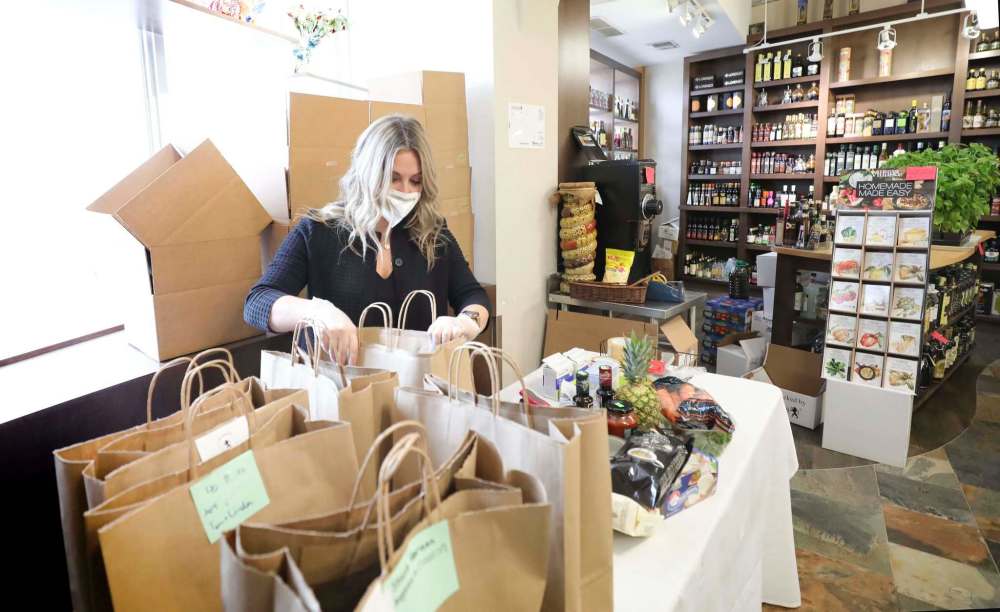‘No going back after this’
A robust e-commerce platform could mean difference between life and death for many locked-down businesses
Advertisement
Read this article for free:
or
Already have an account? Log in here »
To continue reading, please subscribe:
Monthly Digital Subscription
$1 per week for 24 weeks*
- Enjoy unlimited reading on winnipegfreepress.com
- Read the E-Edition, our digital replica newspaper
- Access News Break, our award-winning app
- Play interactive puzzles
*Billed as $4 plus GST every four weeks. Offer only available to new and qualified returning subscribers. Cancel any time.
Read unlimited articles for free today:
or
Already have an account? Log in here »
Hey there, time traveller!
This article was published 21/04/2020 (1746 days ago), so information in it may no longer be current.
On top of the tragic loss of life and devastating health consequences, the COVID-19 crisis will surely leave some economic wreckage along the way.
One category of damage is likely to be determined by the way retailers and merchants used e-commerce before and after. Some experts worry that many of those who had not committed to e-commerce prior to the crisis might not be around for the debrief.
Statistics Canada just released retail figures for February that showed e-commerce sales were up 18 per cent year over year, with total retail basically flat at 0.2 per cent growth across the country.

That was before the national lockdown in mid-March, after which all bets were off. In its daily economic update on Tuesday, RBC said its data shows sales fell sharply after mid-March.
With forced closures of restaurants and the expectation that retail foot traffic will slump for an indeterminate amount of time when the economy does finally open up, food service operations and retailers are scrambling to beef up their e-commerce capabilities.
De Luca’s, the Winnipeg specialty food store, had the good fortune of being in the planning phase to get a proper e-commerce platform in place before the shutdown occurred.
Carla De Luca of De Luca’s said it has been able to launch grocery sales out of its new location in the south end of the city, allowing customers to order and pay online, and is in the process of providing customers of its Portage Avenue location the same convenience.
“It’s definitely changed our business,” she said. “We are pushing the business forward toward e-commerce now. It is something that is not going to go away. That’s what customers seem to want — the ease of ordering and paying online and the ability to do really quick transactions.”
The COVID-19 crisis is such a singular phenomenon that it renders a lot of economic forecasting models inoperable, but few disagree that it will accelerate the preponderance of e-commerce.
Jason Myers, one of the co-founders of Winnipeg’s Bold Commerce, said while some of its 100,000 merchant clients have uninstalled some of their Bold apps because business is so slow, others are doing more business than ever.
“Online shopping is way up… but also never before have so many stores closed,” he said.
Bold remains busy and has been able to manage its burgeoning workforce while they all work from home and has been able to keep almost all of them employed.
And while Myers is reluctant to crow about how well the company is doing — like many, he is worried about the impact of so many people now left without work — he does believe the current crisis is going to be a boon for e-commerce and for the companies who had already committed to that platform before the lockdown.
“E-commerce is in a really good position. This industry is going to come out in good shape because of all this,” he said. “It is speeding up the strategies that a lot of these brands already had.”
For instance, he said many companies are feverishly launching online ordering for pickup at stores. He believes those kinds of features will prove to be too convenient to lapse after things return to normal.
Jan Regehr, the owner of Pineridge Hollow in Oakbank, had set up a Shopify e-commerce site three years ago that she used mostly for merchandise sales and some event booking.
But with her 180-seat restaurant and event space forced to close, she’s now able to launch an e-commerce meal and food delivery service.

“Our e-commerce was never a big income generator but having the site allowed us to pivot really quickly,” she said. “It’s given us the flexibility when we really needed to have an e-commerce option.”
Charles Desjardins, partner and executive vice-president of Absolunet, a 250-person Montreal-based e-commerce consultancy, is even more unequivocal about the importance of e-commerce now and in the aftermath of the economic freeze-up.
“It is a huge transformation,” he said. “There will be no going back after this.”
Desjardins recently spoke with the CEOs of two of his retail clients: one, a furniture/home decor chain with more than 50 stores across the country; and the other, a sporting goods store with five locations. All of their physical locations have been closed for a month.
Both of them said their sales volumes have been almost identical as the same period last year.
“The e-commerce factor is massive,” he said. “The furniture/home décor CEO is more concerned that reopening the stores will bring him down to a certain degree.”
He said the company is already considering scaling back hours, staff size, renegotiating leases and possibly even shutting down locations.
Obviously, that is a chilling prospect for the owners of the countless millions of square feet of commercial real estate.
“At the end of the day people are changing their behaviour,” he said. “They will not go back.”
martin.cash@freepress.mb.ca

Martin Cash
Reporter
Martin Cash has been writing a column and business news at the Free Press since 1989. Over those years he’s written through a number of business cycles and the rise and fall (and rise) in fortunes of many local businesses.
Our newsroom depends on a growing audience of readers to power our journalism. If you are not a paid reader, please consider becoming a subscriber.
Our newsroom depends on its audience of readers to power our journalism. Thank you for your support.
History
Updated on Tuesday, April 21, 2020 7:52 PM CDT: Adds photo

